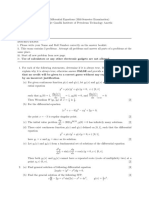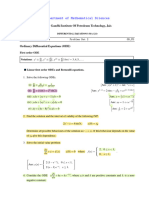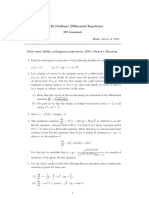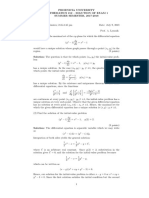Assignment 1
Uploaded by
JOHNAssignment 1
Uploaded by
JOHNMTH 421A
Assignment - 1
1. Compute a Lipschitz constant K and then show that f (x, y) = p(x) cos y + q(x) sin y,
satisfies Lipschitz condition within {(x, y) : |x| ≤ 10, |y| ≤ ∞}, where p(x) an q(x) are
continuous functions on −10 ≤ x ≤ 10.
2. Show that f (x, y) = x|y| satisfies Lipschitz condition in the region {(x, y) : |x| ≤
1, |y| ≤ ∞}.
3. Let K1 and K2 be positive constants and let f be a continuous
Z x nonnegative function
on α ≤ x ≤ β satisfying inequality f (x) ≤ K1 + K2 f (s)ds. Show that f (x) ≤
α
K1 exp (K2 (x − α)).
4. For each of the following problems compute the first four successive approximations
y0 (x), y1 (x), y2 (x), y3 (x)
′
(i) y = x2 + y 2 , y(0) = 0,
′
(ii) y = 1 + xy, y(0) = 1,
′
(iii) y = y 2 , y(0) = 0,
′
(iv) y = y 2 , y(0) = 1.
′
5. Construct the Picard iterates for the initial-value problem y = 2x(y + 1), y(0) = 0
2
and show that they converge to the solution y(x) = ex − 1.
6. For each of the following problems show that the solution y(x) of the given IVP exists
on the specified interval:
′
(i) y = y 2 + cos x2 , y(0) = 0; 0 ≤ x ≤ 21 ,
′
(ii) y = 1 + y + y 2 cos x, y(0) = 0; 0 ≤ x ≤ 13 ,
′ 2
(iii) y = e−x + y 2 , y(0) = 0; 0 ≤ x ≤ 12 .
′′ ′
7. Prove that the initial value problem y + g(x, y) = 0, y(0) = y0 , y (0) = z0 where g is
continuous in someZ region D containing (0, y0 ), is equivalent to the integral equation
x
y(x) = y0 + z0 x − (x − s)g(s, y(s))ds.
0
dy √
8. Find all solutions of dx
= 2 y, y(0) = 1. Which of them does Picard’s iteration
approximate?
dy
9. Find all initial conditions such that (x2 − 4x) dx = (2x − 4)y has no solution, precisely
one solution and more than one solution.
dy
10. If p(x) and r(x) in equation dx + p(x)y = r(x) are continuous for all x in an interval
|x − x0 | ≤ a, show that f (x, y) in this ODE satisfies the conditions of Existence
Theorem, so that a corresponding initial value problem has a unique solution.
You might also like
- Tribute To Teacher Retirees 2017 With The Theme: "Precious Gems Stored in The Treasure Chest of Memories"100% (17)Tribute To Teacher Retirees 2017 With The Theme: "Precious Gems Stored in The Treasure Chest of Memories"5 pages
- Instructor: Dr. J. C. Kalita and Dr. Shubhamay SahaNo ratings yetInstructor: Dr. J. C. Kalita and Dr. Shubhamay Saha3 pages
- MAS 201 Spring 2021 (CD) Differential Equations and ApplicationsNo ratings yetMAS 201 Spring 2021 (CD) Differential Equations and Applications23 pages
- ASSIGNMENT - 4 (Numerical Solution of Ordinary Differential Equations) Course: MCSC 202No ratings yetASSIGNMENT - 4 (Numerical Solution of Ordinary Differential Equations) Course: MCSC 2021 page
- MA 102 (Ordinary Differential Equations)No ratings yetMA 102 (Ordinary Differential Equations)2 pages
- Mathematics 1St First Order Linear Differential Equations 2Nd Second Order Linear Differential Equations Laplace Fourier Bessel MathematicsFrom EverandMathematics 1St First Order Linear Differential Equations 2Nd Second Order Linear Differential Equations Laplace Fourier Bessel MathematicsNo ratings yet
- Republic of The Philippines Professional Regulation Commission ManilaNo ratings yetRepublic of The Philippines Professional Regulation Commission Manila4 pages
- Care of The Mother, Child and Adolescent (Well Client) Related Learning ExperienceNo ratings yetCare of The Mother, Child and Adolescent (Well Client) Related Learning Experience7 pages
- Sculptures, Greece Has Contested This, and Its Position HasNo ratings yetSculptures, Greece Has Contested This, and Its Position Has2 pages
- Download Complete (Ebook) Rapid Quantitative Aptitude - With Shortcuts & Tricks for Competitive Exams by Deepak Agarwal; D.P. Gupta PDF for All Chapters100% (4)Download Complete (Ebook) Rapid Quantitative Aptitude - With Shortcuts & Tricks for Competitive Exams by Deepak Agarwal; D.P. Gupta PDF for All Chapters67 pages
- United States v. Lamont David Ames, 4 F.3d 986, 4th Cir. (1993)No ratings yetUnited States v. Lamont David Ames, 4 F.3d 986, 4th Cir. (1993)3 pages
- Link JECUAN To LA FLORIDA Installation ReportNo ratings yetLink JECUAN To LA FLORIDA Installation Report5 pages
- Industrial Employment (Standing Orders) Act, 1946100% (1)Industrial Employment (Standing Orders) Act, 194624 pages
- Garden Leave and Settlement Agreements Monaco SolicitorsNo ratings yetGarden Leave and Settlement Agreements Monaco Solicitors1 page
- Creating Developmental Questions: Session 4a: Learner GuideNo ratings yetCreating Developmental Questions: Session 4a: Learner Guide9 pages
- Luciferian Witchcraft - The Mystery RevealedNo ratings yetLuciferian Witchcraft - The Mystery Revealed3 pages

























































































